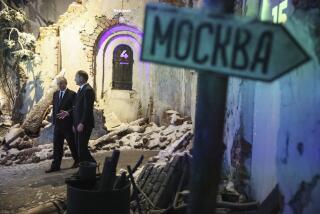Soviets to Let Inspectors Visit Nuclear Reactors
- Share via
VIENNA — The Soviet Union will allow international atomic energy experts to inspect its Chernobyl-type nuclear reactors for safety, a top Soviet nuclear expert said Friday.
The Chernobyl-type reactors account for about half the nuclear power in the Soviet Union.
The Soviets announced their decision to open their RBMK graphite-moderated, water-cooled reactors for a safety review at a weeklong international conference here on nuclear safety.
The Soviet Union has 16 RBMK reactors in operation at five nuclear sites. Three are in the Russian republic, one is in newly independent Lithuania and the Chernobyl plant is in the Ukraine.
The No. 4 reactor at Chernobyl exploded in April, 1986, sending a cloud of radiation around the world and contaminating sections of the Ukraine, Byelorussia and southern Russia where about 1 million people live.
The fire and acute radiation sickness from the accident killed 31 people outright. Scientists suggest that the death toll is considerably higher--estimates run from tens to hundreds of thousands over the lifetime of the exposed population--because of radiation-induced cancers.
The Soviet nuclear power industry is the world’s third-largest after the United States and France, and supplies about 12% of its electrical power, says the Natural Resources Defense Council in Washington.
German Environment Minister Klaus Toepfer, who led the conference held at the International Atomic Energy Agency headquarters, called for an international law to impose standards on nuclear safety.
The conference, attended by 350 experts, adopted a 10-point declaration outlining the need for enforcement of nuclear safety “by all governments.”
The chief Soviet delegate, Andrei Gagarinski of the Soviet Nuclear Society, said that a program of implementing safety measures that began immediately after the Chernobyl accident is nearly completed.
Gagarinski acknowledged that most scientists suspect safety was lacking in RBMK reactors.
“We are ready for international cooperation under an IAEA umbrella for a serious analysis” of safety at the Chernobyl-type reactors, he said.
More to Read
Sign up for Essential California
The most important California stories and recommendations in your inbox every morning.
You may occasionally receive promotional content from the Los Angeles Times.










